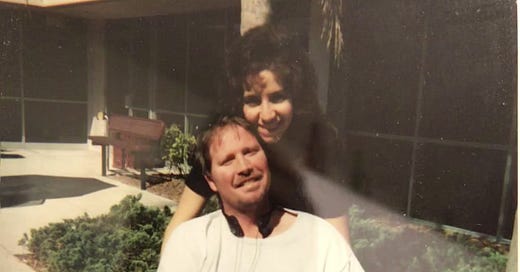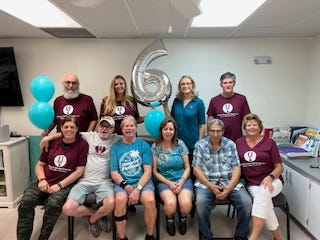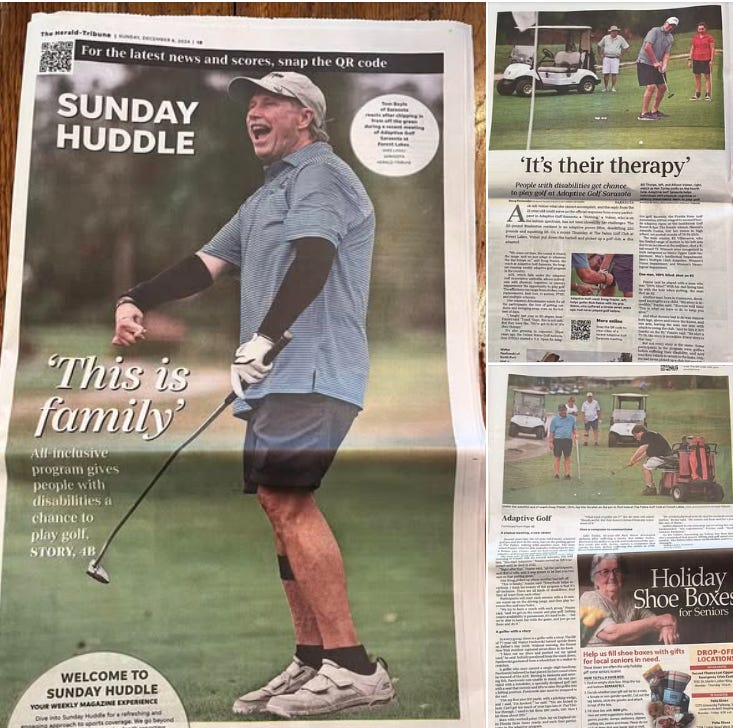In Her Words: Erika Boyle, 56, Turns Heartbreak into Hope with the Aphasia Community Center
As a natural born advocate and champion of the underdog, Erika's work to build community and provide support for people with aphasia has changed lives for the better.
I moved from Boston to Florida in 1999. That’s when I met Tom. We lived across the hall from each other. We were friends for about a year, and then we started dating. About two months into the relationship, Tom and I both already knew that we were made for one another and that we were eventually going to get married. And then he had a massive stroke where he almost died. Tom was 39 at the time, and I was 32. My world was turned upside down. Tom couldn’t read, speak, think, walk, or talk. He was completely paralyzed on the right side.
Everyone said “Leave him. You don’t owe him anything.” I probably would’ve given the same advice. My family hadn't even met Tom yet, because we had only been dating for two months. Once they met him, they saw how much we loved each other, how much of a champion he was, and how resilient he was, and they totally fell in love with him. In fact, Tom can do no wrong in my mom’s eyes.
We got married two years after Tom’s stroke. We had both been married before, so we went to Las Vegas to get married. Because he had aphasia, Tom could barely say a few words at a time. We practiced all day for him to say “I, Tom, take you, Erika, to be my wife.” It was a real struggle. When we got to the chapel, I spoke to the minister and explained that he had a stroke and could barely speak. It turns out all Tom needed to say was “I do.”
Finding Community
Tom was so young. It just wasn’t right. I advocated and pushed, and Tom worked hard, but we felt so isolated. No one we knew had aphasia. We sought out a support group and found one at Sarasota Memorial Hospital, right in Sarasota, Florida, where we live. We joined the group and immediately felt at home with other people with aphasia. That group instantly became our new family. We absolutely loved that group. We were in it for six years.
Fast forward to 2007, and the support group was getting stagnant. They changed the venue, they changed the time, and people didn’t like it. I approached another caregiver, Diane Lombard, whose husband also had a stroke, and I said, “Hey, we can do this. Let’s just start our own support group.” Diane said “Okay,” and in 2007, we started the Suncoast Aphasia Support Group. The group has been going strong ever since.
In 2016, Donna Pollele joined the group. She’s a retired speech pathologist and a professor at University of South Florida. She came to our support group meetings as an observer, just loved the group, and became part of our friend network. At one point, Donna approached me and said, “What do you think about having an Aphasia Community Center?” We had thought about it over the years, but she gave us that extra push. The Aphasia Community Center was officially launched in October of 2018, and Donna and I are co-founding board members.

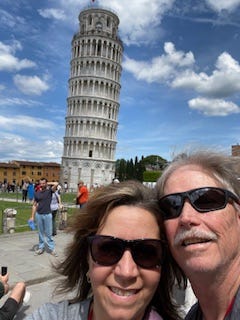
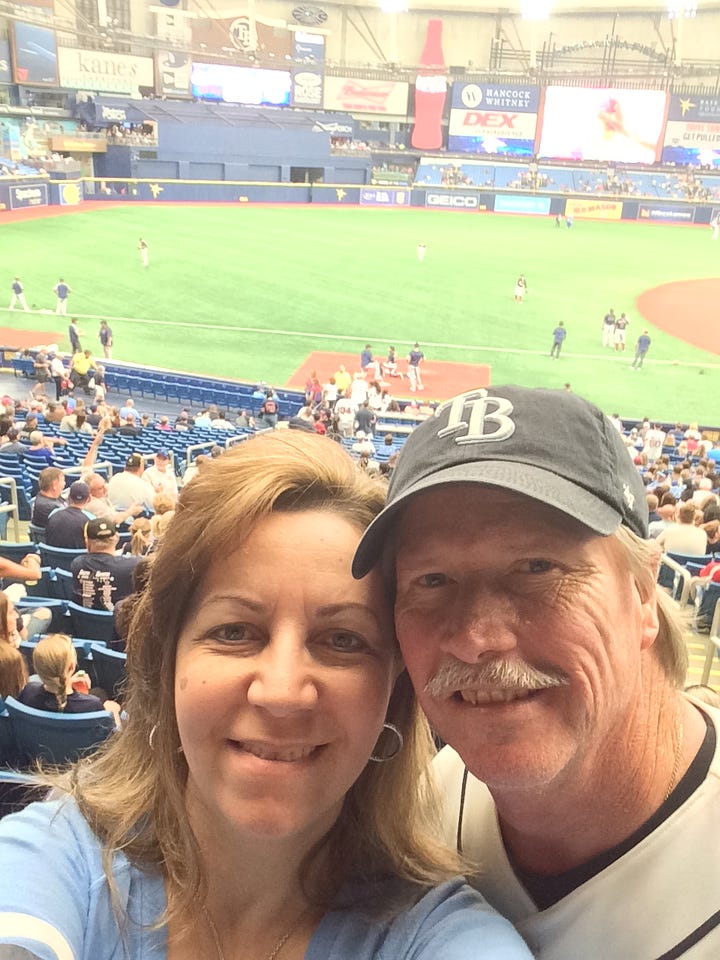

When Donna first approached me, we agreed it was really important that the center would be free for members. When Tom had his stroke 24 years ago, the only community centers like this were available through six-week live-in programs, which cost about $30,000. We had to pay for speech therapy and occupational and physical therapy on our own after insurance ran out, which happened two months after his stroke. So, it was really important to me that our center would be free. We’re a 501(c)3 non-profit organization and we do not charge for our services at all.
We currently have about 40 members. While we have a diverse group of people of different ages, races, and demographics, I’ve observed that it’s mostly men who’ve had strokes who have aphasia. We do have some women, but it’s mostly men. If I had to do a second level demographic, I would say it’s mostly successful retired men.
Our support group has become a family thing. We do holidays, birthdays, and weddings together. We do dinners out, picnic barbecues, baseball games and we’ve traveled to Europe and on cruises. We have half day programs, classes, and activities for people with aphasia. It’s not speech therapy, but it’s a complement. We have a writing class, a reading class, and an art class, which has been super successful. We also have a conversation group, and an augmentative, alternative communication group as a lot of people use a device to communicate.
We have a number of class facilitators who are co-survivors. My husband, Tom, who by now, has totally blossomed, teaches a sports class. He calls it Sports Talk, and he engages others with aphasia in sports discussions. He also does a chat group twice a month where they sometimes play games, or they just have a chat. He calls it the Siesta Key Group. He now has people from all over the U.S., so he’s like this rockstar out there. Tom is the only facilitator who has aphasia.
Tom has turned out to be quite an amazing man. He took his stroke, and he took his aphasia, and he did something with it. He teaches a class at the Aphasia Community Center. He’s a mentor to people. He volunteers at Sarasota Memorial Hospital as a golf cart driver. He volunteers at Florida adaptive golf. He taught himself how to golf one-handed, wearing an AFO (ankle-foot orthosis), which is a brace on his leg. Now he’s teaching other people who have disabilities how to golf. Since the stroke, he’s had four holes in one! Tom and two other members, Rick and Ken, were recently featured in the Sarasota Herald Tribune for adaptive golf.
Living with aphasia is frustrating. It can be depressing. It’s hard. There are so many misunderstandings. Everyone’s experience is different, but cognitive deficits are a big part of aphasia and reading and writing, telling time, numbers, math, checkbooks — all that stuff can be affected in addition to speech.
We feel that God gave Tom the stroke for a reason. He had a plan for Tom to become a mentor, a volunteer, and an activist, and for me to become an advocate. Last year we started an Aphasia Peer Mentor Program at Sarasota Memorial Hospital with Tom, our friend, Rick Reese, and fellow center director, Becky Reese, and I are official volunteers there. When a new patient on the post stroke floor has aphasia, we go in and talk to them about the Aphasia Community Center. We give them information and invite them to contact us when they’re ready to get back into life. We didn’t have that years ago. We had nothing.
There was one gentleman who had a stroke and has aphasia, who came into the support group about a year ago, and now he is fully involved in the Aphasia Community Center. He told us that we, the center and the support group, have given him a reason to get out of bed in the morning and to get dressed and showered and shaved and participate in life.
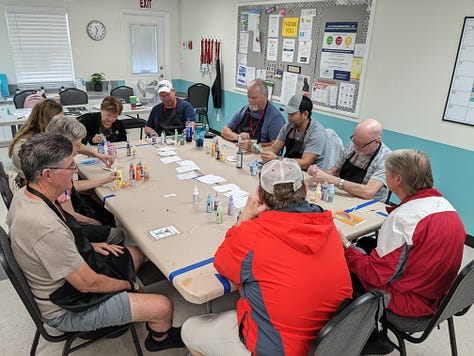

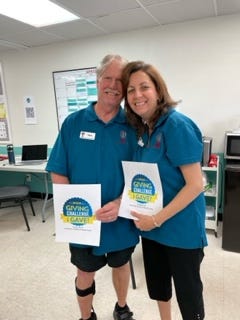
When we have new people coming into the group or to the center and I see the look on their faces and I hear the co-survivor’s anguish, I can’t help but be an advocate. I’ve been there and done that. I love being able to say, “Here are a bunch of resources that we didn’t have 24 years ago. You’ve got a ready-made group and a ready-made center. Yeah, take advantage of it.”
What prepared you for this role as caregiver, advocate, and organizer?
I think a couple of things. My mom says I was born like this. She tells me that, when I was young, there were some family issues, and I noticed what wasn't right, and was vocal about it. Later, when I was about 16, my mom was going through a tough time and I took over all the bills and responsibilities for the household, because she couldn't do it at the time. She always tells me I should have been a lawyer, because I fight for the underdog. I'll argue something, but in a good way. Some of this was natural for me, but I didn't necessarily know I had it in me until Tom had a stroke.
If you were to go back in time, what would you tell your 25-year-old self?
I was married to my first husband at age 25. I wouldn’t have changed anything. If I had been in a happy marriage, I would have never met Tom. I would tell myself, stay on the path, because everything’s going to bring you to this point when you’re 30 years old and you meet Tom and then your life is going to change even more.
Belle Curve Stories is about women navigating life with grit, grace, and growth. What do those three words mean to you?
I have a strong personality. I’m an advocate, and I’m a champion for the underdog. That’s the grit part of it. That’s naturally who I am.
As for growth, everything has evolved from 24 years ago to now. Our hope — well, my dream — would be to win the lottery so that I could buy a building in Sarasota and have an even bigger center where we could have all day classes, Monday through Friday and then start another center in the Fort Myers/Naples area, and then in Miami because there’s a need there. That would be my dream.
Throughout this whole journey, my faith and Tom’s faith really helped us. There were so many times we were desperate for money. I just put it in God’s hands, and it happened. He gave us exactly what we needed when we needed it. It was just wild.
As told to and edited by Teresa Bellock and Sandra Ditore.
Erika Boyle, 56, stroke co-survivor, 23-year commercial insurance industry professional, co-founded the Suncoast Aphasia Support Group in 2007 and the Aphasia Community Center (ACC) in 2018. Currently, she is the ACC treasurer and director. Erika is an aphasia advocate and continues to bring resources and community to those affected by aphasia in the Sarasota area. Erika is also the proud wife of Tom Boyle, a stroke survivor. You can follow ACC on Facebook @SarasotaACC.


